Could a visit to the dentist save you from a trip to the heart surgeon?
Medical science suggest a lot about how cardiovascular health is influenced by what you eat on a regular basis. Fatty and sugary food items, cigarettes , chewing tobacco, alcohol are the most highlighted things for decades now.
But what about the mouth itself?
In fact, people with long standing tooth infections are 2.7 times more likely to have cardiovascular problems like coronary artery disease than people with healthy mouth and oral hygiene, according to a 2016 study in the Journal of Dental Research.
The Heart Valve connection
Scientists have known about the link between oral health and one specific kind of heart issue for a long time.
valves are a kind of tiny spigots in our heart that keeps the blood flowing between its chambers and restricts the backflow. An infection in valve can cause a host of symptoms, such as shortness of breath and chest pain ― and it’s potentially fatal. Mild cases of endocarditis can be treated with intravenous antibiotics, but surgical valve replacement may be needed in some cases.
And you can get it from a toothache?
People can get streptococcus bacteria from the mouth or infected tooth that goes into the blood stream and goes down and latches onto the valves causing an infection.

Role that dental problems play in hear attack:
More recent to medical science is the discovery that people with dental issues have a significantly higher risk of developing problems not just with their heart valves but with their arteries. A link can be established between oral infections and a hardening of the portal system that carries oxygen-rich blood out to your vital organs.
Hardening in the arteries is often seen when there’s a disposition of fatty substances inside the walls of these blood vessels, leading to a blockage and ultimately causing a heart attack.

Incidentally, the material blocking the arteries is referred to as plaque – but it’s a completely different kind of substance than the kind that coats your teeth and causes cavities.
So what’s the connection between tooth decay and arterial blockages? Doctors aren’t quite sure about it yet, but some theories are there –
Theory 1: Bacteria
The bacteria that infects the gums and teeth – often it’s streptococcus, but it can be other varieties – can get into the blood stream.
Theory 2: Inflammation.
When people have a chronic infection in the gums, associated chronic inflammations can rise elsewhere.
During the past 30 years or so, research has shown that people with higher levels of inflammation in their bodies are more likely to have heart attacks and strokes. The thinking is that when people have an infection in their mouth, they can set off an inflammatory response in the body. In responding to it, the immune system can become highly aggressive, and the hardening of the arteries is the result of an irritation caused by that response and host defence mechanisms.
Theory 3: It’s incidental
People who don’t take care of their teeth are more likely to have bad habits that lead to heart disease. In this case, any arterial problems have nothing to do with bacteria or inflammation. The connection between dental health and heart health is that people with severe dental problems also might smoke or eat foods that are bad for them.
What should be done in preventing such situations?
According to research and finding it is seen that 5 signs – 1. Diabetes 2. High Cholesterol 3. High blood pressure 4. Habits of smoking & 5. Family history of heart problems are mostly associated with a major issue with heart and a lesser extent due to your teeth.
But we should always keep in mind a healthy life style and proper maintenance of oral hygiene by brushing & flossing can protect us from many severe health issues.


